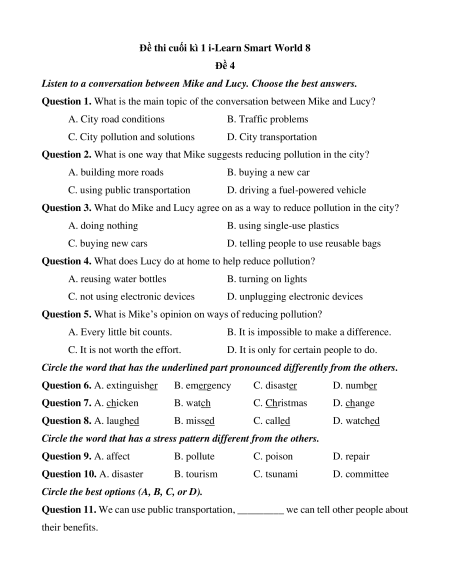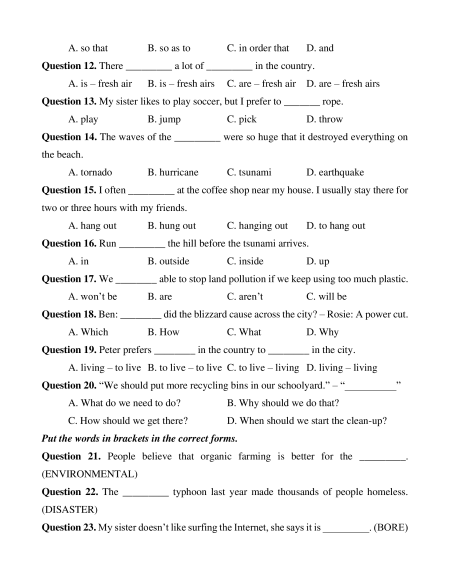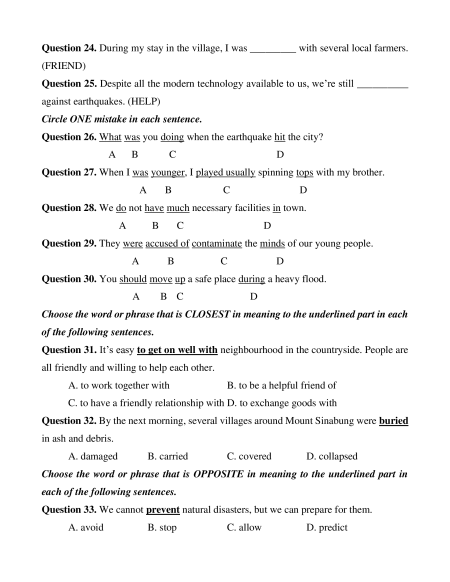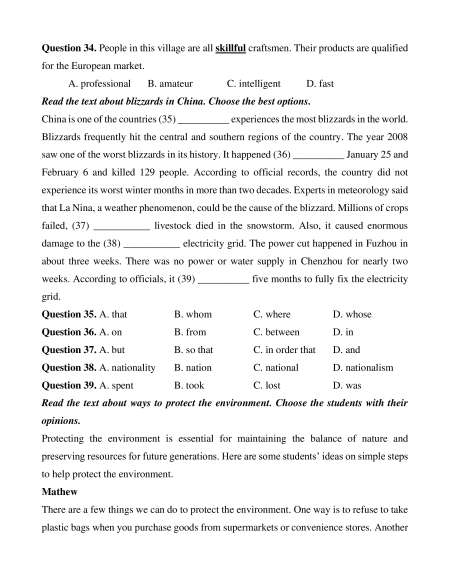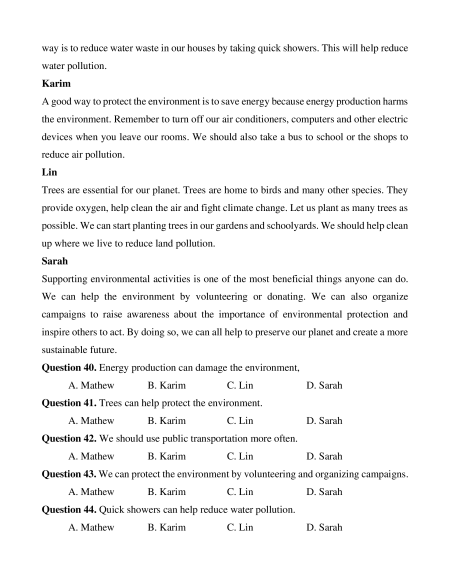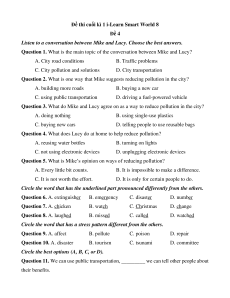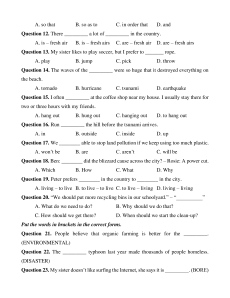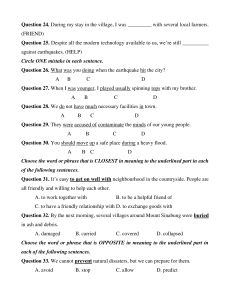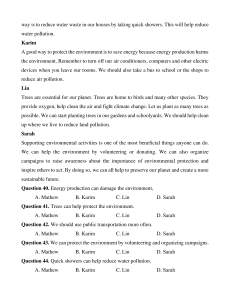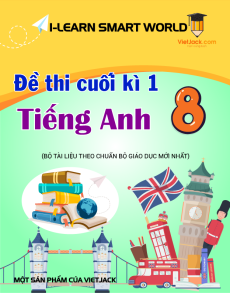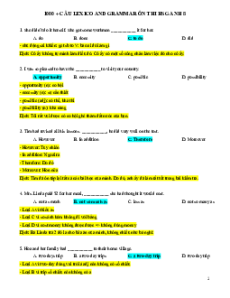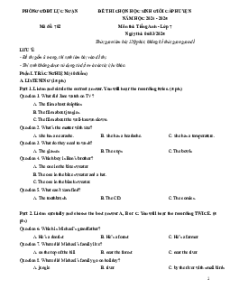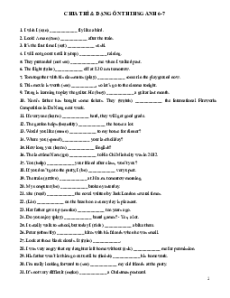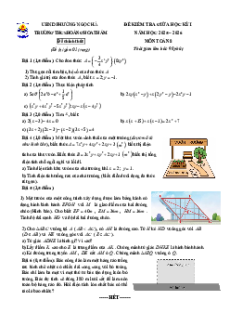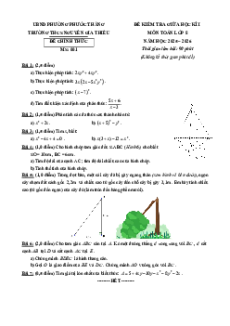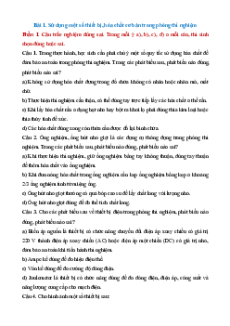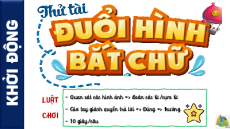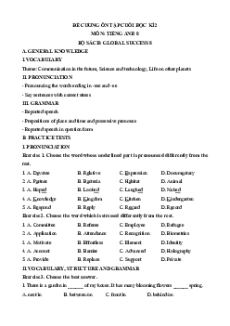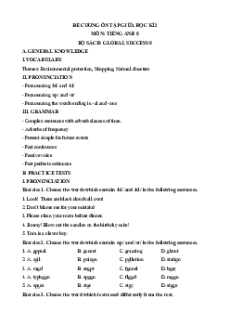Đề thi cuối kì 1 i-Learn Smart World 8 Đề 4
Listen to a conversation between Mike and Lucy. Choose the best answers.
Question 1. What is the main topic of the conversation between Mike and Lucy? A. City road conditions B. Traffic problems
C. City pollution and solutions D. City transportation
Question 2. What is one way that Mike suggests reducing pollution in the city? A. building more roads B. buying a new car
C. using public transportation
D. driving a fuel-powered vehicle
Question 3. What do Mike and Lucy agree on as a way to reduce pollution in the city? A. doing nothing B. using single-use plastics C. buying new cars
D. telling people to use reusable bags
Question 4. What does Lucy do at home to help reduce pollution? A. reusing water bottles B. turning on lights
C. not using electronic devices
D. unplugging electronic devices
Question 5. What is Mike’s opinion on ways of reducing pollution? A. Every little bit counts.
B. It is impossible to make a difference.
C. It is not worth the effort.
D. It is only for certain people to do.
Circle the word that has the underlined part pronounced differently from the others.
Question 6. A. extinguisher B. emergency C. disaster D. number Question 7. A. chicken B. watch C. Christmas D. change Question 8. A. laughed B. missed C. called D. watched
Circle the word that has a stress pattern different from the others. Question 9. A. affect B. pollute C. poison D. repair
Question 10. A. disaster B. tourism C. tsunami D. committee
Circle the best options (A, B, C, or D).
Question 11. We can use public transportation, _________ we can tell other people about their benefits. A. so that B. so as to C. in order that D. and
Question 12. There _________ a lot of _________ in the country. A. is – fresh air
B. is – fresh airs C. are – fresh air D. are – fresh airs
Question 13. My sister likes to play soccer, but I prefer to _______ rope. A. play B. jump C. pick D. throw
Question 14. The waves of the _________ were so huge that it destroyed everything on the beach. A. tornado B. hurricane C. tsunami D. earthquake
Question 15. I often _________ at the coffee shop near my house. I usually stay there for
two or three hours with my friends. A. hang out B. hung out C. hanging out D. to hang out
Question 16. Run _________ the hill before the tsunami arrives. A. in B. outside C. inside D. up
Question 17. We ________ able to stop land pollution if we keep using too much plastic. A. won’t be B. are C. aren’t C. will be
Question 18. Ben: ________ did the blizzard cause across the city? – Rosie: A power cut. A. Which B. How C. What D. Why
Question 19. Peter prefers ________ in the country to ________ in the city.
A. living – to live B. to live – to live C. to live – living D. living – living
Question 20. “We should put more recycling bins in our schoolyard.” – “__________” A. What do we need to do? B. Why should we do that? C. How should we get there?
D. When should we start the clean-up?
Put the words in brackets in the correct forms.
Question 21. People believe that organic farming is better for the _________. (ENVIRONMENTAL)
Question 22. The _________ typhoon last year made thousands of people homeless. (DISASTER)
Question 23. My sister doesn’t like surfing the Internet, she says it is _________. (BORE)
Question 24. During my stay in the village, I was _________ with several local farmers. (FRIEND)
Question 25. Despite all the modern technology available to us, we’re still __________ against earthquakes. (HELP)
Circle ONE mistake in each sentence.
Question 26. What was you doing when the earthquake hit the city? A B C D
Question 27. When I was younger, I played usually spinning tops with my brother. A B C D
Question 28. We do not have much necessary facilities in town. A B C D
Question 29. They were accused of contaminate the minds of our young people. A B C D
Question 30. You should move up a safe place during a heavy flood. A B C D
Choose the word or phrase that is CLOSEST in meaning to the underlined part in each
of the following sentences.
Question 31. It’s easy to get on well with neighbourhood in the countryside. People are
all friendly and willing to help each other. A. to work together with B. to be a helpful friend of
C. to have a friendly relationship with D. to exchange goods with
Question 32. By the next morning, several villages around Mount Sinabung were buried in ash and debris. A. damaged B. carried C. covered D. collapsed
Choose the word or phrase that is OPPOSITE in meaning to the underlined part in
each of the following sentences.
Question 33. We cannot prevent natural disasters, but we can prepare for them. A. avoid B. stop C. allow D. predict
Question 34. People in this village are all skillful craftsmen. Their products are qualified for the European market. A. professional B. amateur C. intelligent D. fast
Read the text about blizzards in China. Choose the best options.
China is one of the countries (35) __________ experiences the most blizzards in the world.
Blizzards frequently hit the central and southern regions of the country. The year 2008
saw one of the worst blizzards in its history. It happened (36) __________ January 25 and
February 6 and killed 129 people. According to official records, the country did not
experience its worst winter months in more than two decades. Experts in meteorology said
that La Nina, a weather phenomenon, could be the cause of the blizzard. Millions of crops
failed, (37) ___________ livestock died in the snowstorm. Also, it caused enormous
damage to the (38) ___________ electricity grid. The power cut happened in Fuzhou in
about three weeks. There was no power or water supply in Chenzhou for nearly two
weeks. According to officials, it (39) __________ five months to fully fix the electricity grid. Question 35. A. that B. whom C. where D. whose Question 36. A. on B. from C. between D. in Question 37. A. but B. so that C. in order that D. and
Question 38. A. nationality B. nation C. national D. nationalism Question 39. A. spent B. took C. lost D. was
Read the text about ways to protect the environment. Choose the students with their opinions.
Protecting the environment is essential for maintaining the balance of nature and
preserving resources for future generations. Here are some students’ ideas on simple steps
to help protect the environment. Mathew
There are a few things we can do to protect the environment. One way is to refuse to take
plastic bags when you purchase goods from supermarkets or convenience stores. Another
Đề thi cuối kì 1 Tiếng Anh 8 ilearn smart world (Đề 4 kèm file nghe)
1.5 K
775 lượt tải
MUA NGAY ĐỂ XEM TOÀN BỘ TÀI LIỆU
CÁCH MUA:
- B1: Gửi phí vào TK:
1133836868- CT TNHH DAU TU VA DV GD VIETJACK - Ngân hàng MB (QR) - B2: Nhắn tin tới Zalo VietJack Official ( nhấn vào đây ) để xác nhận thanh toán và tải tài liệu - giáo án
Liên hệ ngay Hotline hỗ trợ: 084 283 45 85
Đề thi được cập nhật liên tục trong gói này từ nay đến hết tháng 3/2024. Chúng tôi đảm bảo đủ số lượng đề đã cam kết hoặc có thể nhiều hơn, tất cả có BẢN WORD, LỜI GIẢI CHI TIẾT và tải về dễ dàng.
Để tải tài liệu gốc về máy bạn click vào nút Tải Xuống ở trên!
Thuộc bộ (mua theo bộ để tiết kiệm hơn):
- Tailieugiaovien.com.vn giới thiệu bộ đề thi cuối kì 1 kèm file nghe Tiếng anh 8 ilearn smart world mới nhất nhằm giúp Giáo viên có thêm tài liệu tham khảo ra đề thi Tiếng anh lớp 8.
- File word có lời giải chi tiết 100%.
- Mua trọn bộ sẽ tiết kiệm hơn tải lẻ 50%.
Đánh giá
4.6 / 5(1549 )5
4
3
2
1
Trọng Bình
Tài liệu hay
Giúp ích cho tôi rất nhiều
Duy Trần
Tài liệu chuẩn
Rất thích tài liệu bên VJ soạn (bám sát chương trình dạy)
TÀI LIỆU BỘ BÁN CHẠY MÔN Tiếng Anh
Xem thêmTÀI LIỆU BỘ BÁN CHẠY Lớp 8
Xem thêmTài liệu bộ mới nhất

Đề thi cuối kì 1 i-Learn Smart World 8
Đề 4
Listen to a conversation between Mike and Lucy. Choose the best answers.
Question 1. What is the main topic of the conversation between Mike and Lucy?
A. City road conditions B. Traffic problems
C. City pollution and solutions D. City transportation
Question 2. What is one way that Mike suggests reducing pollution in the city?
A. building more roads B. buying a new car
C. using public transportation D. driving a fuel-powered vehicle
Question 3. What do Mike and Lucy agree on as a way to reduce pollution in the city?
A. doing nothing B. using single-use plastics
C. buying new cars D. telling people to use reusable bags
Question 4. What does Lucy do at home to help reduce pollution?
A. reusing water bottles B. turning on lights
C. not using electronic devices D. unplugging electronic devices
Question 5. What is Mike’s opinion on ways of reducing pollution?
A. Every little bit counts. B. It is impossible to make a difference.
C. It is not worth the effort. D. It is only for certain people to do.
Circle the word that has the underlined part pronounced differently from the others.
Question 6. A. extinguisher B. emergency C. disaster D. number
Question 7. A. chicken B. watch C. Christmas D. change
Question 8. A. laughed B. missed C. called D. watched
Circle the word that has a stress pattern different from the others.
Question 9. A. affect B. pollute C. poison D. repair
Question 10. A. disaster B. tourism C. tsunami D. committee
Circle the best options (A, B, C, or D).
Question 11. We can use public transportation, _________ we can tell other people about
their benefits.

A. so that B. so as to C. in order that D. and
Question 12. There _________ a lot of _________ in the country.
A. is – fresh air B. is – fresh airs C. are – fresh air D. are – fresh airs
Question 13. My sister likes to play soccer, but I prefer to _______ rope.
A. play B. jump C. pick D. throw
Question 14. The waves of the _________ were so huge that it destroyed everything on
the beach.
A. tornado B. hurricane C. tsunami D. earthquake
Question 15. I often _________ at the coffee shop near my house. I usually stay there for
two or three hours with my friends.
A. hang out B. hung out C. hanging out D. to hang out
Question 16. Run _________ the hill before the tsunami arrives.
A. in B. outside C. inside D. up
Question 17. We ________ able to stop land pollution if we keep using too much plastic.
A. won’t be B. are C. aren’t C. will be
Question 18. Ben: ________ did the blizzard cause across the city? – Rosie: A power cut.
A. Which B. How C. What D. Why
Question 19. Peter prefers ________ in the country to ________ in the city.
A. living – to live B. to live – to live C. to live – living D. living – living
Question 20. “We should put more recycling bins in our schoolyard.” – “__________”
A. What do we need to do? B. Why should we do that?
C. How should we get there? D. When should we start the clean-up?
Put the words in brackets in the correct forms.
Question 21. People believe that organic farming is better for the _________.
(ENVIRONMENTAL)
Question 22. The _________ typhoon last year made thousands of people homeless.
(DISASTER)
Question 23. My sister doesn’t like surfing the Internet, she says it is _________. (BORE)

Question 24. During my stay in the village, I was _________ with several local farmers.
(FRIEND)
Question 25. Despite all the modern technology available to us, we’re still __________
against earthquakes. (HELP)
Circle ONE mistake in each sentence.
Question 26. What was you doing when the earthquake hit the city?
A B C D
Question 27. When I was younger, I played usually spinning tops with my brother.
A B C D
Question 28. We do not have much necessary facilities in town.
A B C D
Question 29. They were accused of contaminate the minds of our young people.
A B C D
Question 30. You should move up a safe place during a heavy flood.
A B C D
Choose the word or phrase that is CLOSEST in meaning to the underlined part in each
of the following sentences.
Question 31. It’s easy to get on well with neighbourhood in the countryside. People are
all friendly and willing to help each other.
A. to work together with B. to be a helpful friend of
C. to have a friendly relationship with D. to exchange goods with
Question 32. By the next morning, several villages around Mount Sinabung were buried
in ash and debris.
A. damaged B. carried C. covered D. collapsed
Choose the word or phrase that is OPPOSITE in meaning to the underlined part in
each of the following sentences.
Question 33. We cannot prevent natural disasters, but we can prepare for them.
A. avoid B. stop C. allow D. predict

Question 34. People in this village are all skillful craftsmen. Their products are qualified
for the European market.
A. professional B. amateur C. intelligent D. fast
Read the text about blizzards in China. Choose the best options.
China is one of the countries (35) __________ experiences the most blizzards in the world.
Blizzards frequently hit the central and southern regions of the country. The year 2008
saw one of the worst blizzards in its history. It happened (36) __________ January 25 and
February 6 and killed 129 people. According to official records, the country did not
experience its worst winter months in more than two decades. Experts in meteorology said
that La Nina, a weather phenomenon, could be the cause of the blizzard. Millions of crops
failed, (37) ___________ livestock died in the snowstorm. Also, it caused enormous
damage to the (38) ___________ electricity grid. The power cut happened in Fuzhou in
about three weeks. There was no power or water supply in Chenzhou for nearly two
weeks. According to officials, it (39) __________ five months to fully fix the electricity
grid.
Question 35. A. that B. whom C. where D. whose
Question 36. A. on B. from C. between D. in
Question 37. A. but B. so that C. in order that D. and
Question 38. A. nationality B. nation C. national D. nationalism
Question 39. A. spent B. took C. lost D. was
Read the text about ways to protect the environment. Choose the students with their
opinions.
Protecting the environment is essential for maintaining the balance of nature and
preserving resources for future generations. Here are some students’ ideas on simple steps
to help protect the environment.
Mathew
There are a few things we can do to protect the environment. One way is to refuse to take
plastic bags when you purchase goods from supermarkets or convenience stores. Another
way is to reduce water waste in our houses by taking quick showers. This will help reduce
water pollution.
Karim
A good way to protect the environment is to save energy because energy production harms
the environment. Remember to turn off our air conditioners, computers and other electric
devices when you leave our rooms. We should also take a bus to school or the shops to
reduce air pollution.
Lin
Trees are essential for our planet. Trees are home to birds and many other species. They
provide oxygen, help clean the air and fight climate change. Let us plant as many trees as
possible. We can start planting trees in our gardens and schoolyards. We should help clean
up where we live to reduce land pollution.
Sarah
Supporting environmental activities is one of the most beneficial things anyone can do.
We can help the environment by volunteering or donating. We can also organize
campaigns to raise awareness about the importance of environmental protection and
inspire others to act. By doing so, we can all help to preserve our planet and create a more
sustainable future.
Question 40. Energy production can damage the environment,
A. Mathew B. Karim C. Lin D. Sarah
Question 41. Trees can help protect the environment.
A. Mathew B. Karim C. Lin D. Sarah
Question 42. We should use public transportation more often.
A. Mathew B. Karim C. Lin D. Sarah
Question 43. We can protect the environment by volunteering and organizing campaigns.
A. Mathew B. Karim C. Lin D. Sarah
Question 44. Quick showers can help reduce water pollution.
A. Mathew B. Karim C. Lin D. Sarah

Complete these sentences.
Question 45. Could you help me with this box?
→ Would you _____________________________________________________?
Question 46. My sister likes to play tug of war. My sister doesn’t like to jump rope. (BUT)
→ ______________________________________________________________.
Question 47. Dozens of people were buried under a massive landslide in Natonin town.
(Make a question for the underlined part.)
→ ______________________________________________________________?
Reorder the words to make full sentences.
Question 48. trees/ so much/ don’t/ We/ if/ we/ waste/ will/ thousands of/ paper/ save/ .
→ ______________________________________________________________.
Question 49. in/ Is/ the country/ living/ healthier/ living/ much/ in/ than/ the city/ ?
→ ______________________________________________________________?
Question 50. taking/ I/ a/ don’t/ in/ winter./ shower/ like
→ ______________________________________________________________.
ĐÁP ÁN VÀ LỜI GIẢI:
Listen to a conversation between Mike and Lucy. Choose the best answers.
Question 1.
Hướng dẫn giải:
Đáp án đúng: C
Dịch: Chủ đề chính của cuộc trò chuyện giữa Mike và Lucy là gì?
A. Điều kiện đường phố B. Vấn đề giao thông
C. Ô nhiễm thành phố và giải pháp D. Giao thông thành phố
Question 2.
Hướng dẫn giải:
Đáp án đúng: C
Dịch: Một cách Mike gợi ý làm giảm ô nhiễm trong thành phố là gì?
A. xây dựng thêm đường

B. mua một chiếc ô tô mới
C. sử dụng phương tiện giao thông công cộng
D. lái xe chạy bằng nhiên liệu
Thông tin: Mike: Well, one way is to use public transportation, or share cars with friends
instead of driving alone. This will reduce the amount of pollution from cars on the road.
(À, có một cách là sử dụng phương tiện giao thông công cộng, hoặc đi chung xe với bạn
bè thay vì lái xe một mình. Điều này sẽ làm giảm lượng ô nhiễm từ ô tô trên đường.)
Question 3.
Hướng dẫn giải:
Đáp án đúng: D
Dịch: Mike và Lucy đồng tình với cách giảm ô nhiễm trong thành phố nào?
A. không làm gì cả
B. sử dụng đồ nhựa dùng một lần
C. mua ô tô mới
D. bảo mọi người sử dụng túi có thể tái sử dụng
Thông tin:
Mike: Exactly! And we can also reduce our use of single-use plastics, like plastic bags
and water bottles. We can bring our own reusable bags and water bottles instead. (Chính
xác! Và chúng ta cũng có thể giảm việc sử dụng đồ nhựa dùng một lần, như túi nhựa và
chai nước. Thay vào đó, chúng ta có thể mang theo túi và chai nước có thể tái sử dụng của
riêng mình.)
Lucy: Right, and we can also recycle…(Đúng vậy, và chúng ta cũng có thể tái chế...)
Question 4.
Hướng dẫn giải:
Đáp án đúng: D
Dịch: Lucy làm gì ở nhà để góp phần giảm thiểu ô nhiễm?
A. tái sử dụng chai nước
B. bật đèn

C. không sử dụng các thiết bị điện tử
D. rút phích cắm các thiết bị điện tử
Thông tin:
Mike: Yes, and we can also save energy by turning off lights and unplugging electronic
devices when we're not using them. This will reduce the amount of pollution. (Đúng vậy,
và chúng ta cũng có thể tiết kiệm năng lượng bằng cách tắt đèn và rút phích cắm các thiết
bị điện tử khi không sử dụng. Điều này sẽ làm giảm lượng ô nhiễm.)
Lucy: I always do that at home. It's so easy to make small changes that can make a big
difference in reducing pollution. (Tớ luôn làm điều đó ở nhà. Thật dễ dàng để thực hiện
những thay đổi nhỏ có thể tạo ra sự khác biệt lớn trong việc giảm ô nhiễm.)
Question 5.
Hướng dẫn giải:
Đáp án đúng: A
Dịch: Ý kiến của Mike về các cách giảm thiểu ô nhiễm là gì?
A. Mỗi một việc đều có ích.
B. Không thể tạo nên sự khác biệt.
C. Nỗ lực đó không đáng chút nào.
D. Việc đó chỉ dành cho một số người nhất định làm.
Thông tin: Mike: Absolutely! Every little bit counts. And if we all work together, we can
make our city a cleaner, healthier place to live. (Chắc chắn rồi! Mỗi một việc đều có ích.
Và nếu tất cả chúng ta cùng nhau chung tay, chúng ta có thể biến thành phố của mình
thành một nơi sạch sẽ hơn, lành mạnh hơn để sống.)
Nội dung bài nghe:
Mike: Hi, have you heard about the pollution problem in our city?
Lucy: Yeah, it's really bad. The air is so dirty, and the river is full of trash.
Mike: I know. But did you know that there are ways we can help reduce pollution?
Lucy: Really? How can we do that?

Mike: Well, one way is to use public transportation, or share cars with friends instead of
driving alone. This will reduce the amount of pollution from cars on the road.
Lucy: That's a great idea! I can also walk or bike to places that are close by instead of
driving.
Mike: Exactly! And we can also reduce our use of single-use plastics, like plastic bags
and water bottles. We can bring our own reusable bags and water bottles instead.
Lucy: Right, and we can also recycle. That way, waste won't end up in landfills where it
can produce greenhouse gases.
Mike: Yes, and we can also save energy by turning off lights and unplugging electronic
devices when we're not using them. This will reduce the amount of pollution.
Lucy: I always do that at home. It's so easy to make small changes that can make a big
difference in reducing pollution.
Mike: Absolutely! Every little bit counts. And if we all work together, we can make our
city a cleaner, healthier place to live.
Dịch bài nghe:
Mike: Xin chào, bạn đã nghe nói về vấn đề ô nhiễm ở thành phố của chúng ta chưa?
Lucy: Rồi, nó thực sự tệ. Không khí quá bẩn và sông thì đầy rác.
Mike: Tớ biết. Nhưng bạn có biết rằng có nhiều cách chúng ta có thể giúp giảm ô nhiễm
không?
Lucy: Thật sao? Làm thế nào chúng ta có thể làm điều đó?
Mike: À, có một cách là sử dụng phương tiện giao thông công cộng, hoặc đi chung xe với
bạn bè thay vì lái xe một mình. Điều này sẽ làm giảm lượng ô nhiễm từ ô tô trên đường.
Lucy: Đó là một ý tưởng tuyệt vời! Tớ cũng có thể đi bộ hoặc đạp xe đến những địa điểm
gần đó thay vì lái xe.
Mike: Chính xác! Và chúng ta cũng có thể giảm việc sử dụng đồ nhựa dùng một lần, như
túi nhựa và chai nước. Thay vào đó, chúng ta có thể mang theo túi và chai nước có thể tái
sử dụng của riêng mình.

Lucy: Đúng vậy, và chúng ta cũng có thể tái chế. Bằng cách đó, chất thải sẽ không bị vứt
ra các bãi chôn lấp, nơi nó có thể tạo ra khí nhà kính.
Mike: Đúng vậy, và chúng ta cũng có thể tiết kiệm năng lượng bằng cách tắt đèn và rút
phích cắm các thiết bị điện tử khi không sử dụng. Điều này sẽ làm giảm lượng ô nhiễm.
Lucy: Tớ luôn làm điều đó ở nhà. Thật dễ dàng để thực hiện những thay đổi nhỏ có thể
tạo ra sự khác biệt lớn trong việc giảm ô nhiễm.
Mike: Chắc chắn rồi! Mỗi một việc đều có ích. Và nếu tất cả chúng ta cùng nhau chung
tay, chúng ta có thể biến thành phố của mình thành một nơi sạch sẽ hơn, lành mạnh hơn
để sống.
Circle the word that has the underlined part pronounced differently from the others.
Question 6.
Hướng dẫn giải:
Đáp án đúng: B
Đáp án B có phần gạch chân được phát âm là /ɜː/, các đáp án còn lại có phần gạch chân
được phát âm là /ə/.
Question 7.
Hướng dẫn giải:
Đáp án đúng: C
Đáp án C có phần gạch chân được phát âm là /k/, các đáp án còn lại có phần gạch chân
được phát âm là /tʃ/.
Question 8.
Hướng dẫn giải:
Đáp án đúng: C
Đáp án C có phần gạch chân được phát âm là /d/, các đáp án còn lại có phần gạch chân
được phát âm là /t/.
Circle the word that has a stress pattern different from the others.
Question 9.
Hướng dẫn giải:

Đáp án đúng: C
Đáp án C có trọng âm rơi vào âm tiết thứ 1, các đáp án còn lại có trọng âm rơi vào âm tiết
thứ 2.
Question 10.
Hướng dẫn giải:
Đáp án đúng: B
Đáp án B có trọng âm rơi vào âm tiết thứ 1, các đáp án còn lại có trọng âm rơi vào âm tiết
thứ 2.
Circle the best options (A, B, C, or D).
Question 11.
Hướng dẫn giải:
Đáp án đúng: D
and: và
so that + clause = so as to + V-inf = in order that + clause: để…
Dịch: Chúng ta có thể sử dụng phương tiện giao thông công cộng và có thể tuyên truyền
cho người khác về lợi ích của nó.
Question 12.
Hướng dẫn giải:
Đáp án đúng: A
“fresh air” là danh từ không đếm được nên không có hình thức số nhiều. → động từ chia
số ít “is”.
Dịch: Ở nông thôn có nhiều không khí trong lành.
Question 13.
Hướng dẫn giải:
Đáp án đúng: B
jump rope: nhảy dây
Dịch: Chị gái tôi thích chơi bóng đá, nhưng tôi thích nhảy dây.
Question 14.

Hướng dẫn giải:
Đáp án đúng: C
tsunami (n): sóng thần
tornado (n): lốc xoáy
hurricane (n): bão
earthquake (n): động đất
Dịch: Cơn sóng thần quá lớn đến nỗi phá hủy mọi thứ trên bãi biển.
Question 15.
Hướng dẫn giải:
Đáp án đúng: A
“often” là dấu hiệu của thì hiện tại đơn.
Dịch: Tôi thường đi chơi ở quán cà phê gần nhà. Tôi thường ở đó hai hoặc ba giờ với bạn
bè.
Question 16.
Hướng dẫn giải:
Đáp án đúng: D
run up the hill: chạy lên đồi
Dịch: Hãy chạy lên đồi trước khi sóng thần ập tới.
Question 17.
Hướng dẫn giải:
Đáp án đúng: A
Câu điều kiện loại 1 (có thật ở hiện tại):
If + S + V (HTĐ) + O, S + will/can + V-inf + O.
Dịch: Chúng ta sẽ không thể ngăn chặn ô nhiễm đất nếu tiếp tục sử dụng quá nhiều nhựa.
Question 18.
Hướng dẫn giải:
Đáp án đúng: C
What: Cái gì

Which: Cái nào
How: Như thế nào
Why: Tại sao
Dịch: Ben: Trận bão tuyết đã gây ra điều gì trên khắp thành phố? – Rose: Mất điện.
Question 19.
Hướng dẫn giải:
Đáp án đúng: D
prefer doing sth to doing sth: thích làm gì hơn làm gì
Dịch: Peter thích sống ở nông thôn hơn sống ở thành phố.
Question 20.
Hướng dẫn giải:
Đáp án đúng: B
A. Chúng ta cần làm gì?
B. Tại sao chúng ta nên làm điều đó?
C. Chúng ta nên tới đó thế nào?
D. Khi nào chúng ta nên bắt đầu dọn dẹp?
Dịch: “Chúng ta nên đặt nhiều thùng rác hơn trong sân trường.” – “ Tại sao chúng ta nên
làm điều đó?”
Put the words in brackets in the correct forms.
Question 21.
Hướng dẫn giải:
Đáp án đúng: environment
Sau mạo từ “the” cần 1 danh từ.
environmental (adj): thuộc về môi trường → environment (n): môi trường
Dịch: Mọi người tin rằng canh tác hữu cơ tốt hơn cho môi trường.
Question 22.
Hướng dẫn giải:
Đáp án đúng: disastrous

Trước danh từ “typhoon” cần 1 tính từ để bổ sung nghĩa cho nó.
disaster (n): thảm họa → disastrous (adj): tàn khốc, thảm khốc
Dịch: Cơn bão thảm khốc năm ngoái đã khiến cho hàng nghìn người mất đi nhà cửa.
Question 23.
Hướng dẫn giải:
Đáp án đúng: boring
Sau “tobe” cần 1 tính từ.
bore (n): việc chán ngắt → boring (adj): nhàm chán
Dịch: Chị gái tôi không thích lướt mạng, chị ấy nói nó nhàm chán.
Question 24.
Hướng dẫn giải:
Đáp án đúng: friendly
Sau “tobe” cần 1 tính từ.
friend (n): bạn → friendly (adj): thân thiện, thân thiết
Dịch: Trong thời gian ở làng, tôi đã thân thiết với một số nông dân địa phương.
Question 25.
Hướng dẫn giải:
Đáp án đúng: helpless
Sau “tobe” cần 1 tính từ.
help (v): giúp đỡ → helpless (adj): không bảo vệ được, bất lực
Dịch: Mặc dù có sẵn tất cả những công nghệ hiện đại, chúng ta vẫn bất lực trước động
đất.
Circle ONE mistake in each sentence.
Question 26.
Hướng dẫn giải:
Đáp án đúng: B
“you” đi với “were”.
Sửa thành: were

Dịch: Bạn đang làm gì khi trận động đất tấn công thành phố?
Question 27.
Hướng dẫn giải:
Đáp án đúng: C
Trạng từ đứng trước động từ thường.
Sửa thành: usually played
Dịch: Khi còn nhỏ, tôi thường chơi con quay với anh trai.
Question 28.
Hướng dẫn giải:
Đáp án đúng: C
“facilities” là danh từ đếm được nên không đi với “much”.
Sửa thành: many
Dịch: Chúng tôi không có nhiều cơ sở vật chất thiết yếu trong thị trấn.
Question 29.
Hướng dẫn giải:
Đáp án đúng: C
be accused of doing sth: bị buộc tội làm gì
Sửa thành: contaminating
Dịch: Họ bị buộc tội làm ô uế tâm hồn giới trẻ chúng ta.
Question 30.
Hướng dẫn giải:
Đáp án đúng: C
move to: di chuyển tới
Sửa thành: to
Dịch: Bạn nên di chuyển đến nơi an toàn trong khi có lũ lụt lớn.
Choose the word or phrase that is CLOSEST in meaning to the underlined part in each
of the following sentences.
Question 31.

Hướng dẫn giải:
Đáp án đúng: C
to get on well with: có mối quan hệ tốt với = to have a friendly relationship with: có mối
quan hệ thân thiện với
to work together with: làm việc cùng với
to be a helpful friend of: là 1 người bạn hữu ích của
to exchange goods with: trao đổi hàng hóa với
Dịch: Ở nông thôn dễ hòa thuận với hàng xóm. Mọi người đều thân thiện và sẵn sàng giúp
đỡ lẫn nhau.
Question 32.
Hướng dẫn giải:
Đáp án đúng: C
buried (v): bị chôn vùi = covered (v): bị che lấp, che phủ
damaged (v): bị hư hỏng
carried (v): được mang
collapsed (v): bị sập
Dịch: Đến sáng hôm sau, một số ngôi làng xung quanh núi Sinabung bị chôn vùi trong tro
bụi và mảnh vụn.
Choose the word or phrase that is OPPOSITE in meaning to the underlined part in
each of the following sentences.
Question 33.
Hướng dẫn giải:
Đáp án đúng: C
prevent (v): ngăn chặn >< allow (v): cho phép
avoid (v): tránh
stop (v): ngừng
predict (v): dự đoán
Dịch: Chúng ta không thể ngăn chặn được thiên tai nhưng có thể chuẩn bị ứng phó.

Question 34.
Hướng dẫn giải:
Đáp án đúng: B
skillful (adj): lành nghề, khéo tay, tài giỏi >< amateur (adj): nghiệp dư
professional (adj): chuyên nghiệp
intelligent (adj): thông minh
fast (adj): nhanh chóng
Dịch: Người dân ở làng này đều là những người thợ lành nghề. Sản phẩm của họ đủ tiêu
chuẩn cho thị trường châu Âu.
Read the text about blizzards in China. Choose the best options.
Question 35.
Hướng dẫn giải:
Đáp án đúng: A
Đại từ quan hệ “that” dùng để thay thế cho danh từ chỉ vật “countries” phía trước.
Dịch: Trung Quốc là một trong những quốc gia hứng chịu nhiều bão tuyết nhất thế giới.
Question 36.
Hướng dẫn giải:
Đáp án đúng: C
between A and B: giữa A và B, từ A đến B
Dịch: Năm 2008 chứng kiến một trong những trận bão tuyết tồi tệ nhất trong lịch sử. Nó
xảy ra từ ngày 25 tháng 1 đến ngày 6 tháng 2 và cướp đi mạng sống của 129 người.
Question 37.
Hướng dẫn giải:
Đáp án đúng: D
Liên từ “and” dùng để nối 2 mệnh đề tương đồng với nhau về mặt ngữ pháp/ nghĩa.
but: nhưng
so that + clause = in order that + clause: để…
Dịch: Hàng triệu mùa màng thất bát và gia súc chết trong bão tuyết.
Question 38.
Hướng dẫn giải:
Đáp án đúng: C
Trước cụm danh từ “electricity grid” cần 1 tính từ để bổ sung nghĩa cho nó.
nationality (n): quốc tịch
nation (n): quốc gia
national (adj): quốc gia
nationalism (n): chủ nghĩa dân tộc
Dịch: Ngoài ra, nó còn gây ra thiệt hại to lớn cho lưới điện quốc gia.
Question 39.
Hướng dẫn giải:
Đáp án đúng: B
It + take(s) + (sb) + khoảng thời gian + to do sth: (Ai đó) mất bao nhiêu thời gian làm gì
Dịch: Theo các quan chức, phải mất 5 tháng để sửa chữa hoàn toàn lưới điện.
Dịch bài đọc:
Trung Quốc là một trong những quốc gia hứng chịu nhiều bão tuyết nhất thế giới. Bão
tuyết thường xuyên tấn công các khu vực miền Trung và miền Nam đất nước. Năm 2008
chứng kiến một trong những trận bão tuyết tồi tệ nhất trong lịch sử. Nó xảy ra từ ngày 25
tháng 1 đến ngày 6 tháng 2 và cướp đi mạng sống của 129 người. Theo hồ sơ chính thức,
đất nước này chưa trải qua những tháng mùa đông tồi tệ nhất trong hơn hai thập kỷ. Các
chuyên gia khí tượng học cho rằng La Nina, một hiện tượng thời tiết, có thể là nguyên
nhân gây ra trận bão tuyết. Hàng triệu mùa màng thất bát và gia súc chết trong bão tuyết.
Ngoài ra, nó còn gây ra thiệt hại to lớn cho lưới điện quốc gia. Việc cắt điện xảy ra ở Phúc
Châu trong khoảng ba tuần. Không có điện và nước ở Sâm Châu trong gần hai tuần. Theo
các quan chức, phải mất 5 tháng để sửa chữa hoàn toàn lưới điện.
Read the text about ways to protect the environment. Choose the students with their
opinions.
Question 40.
Hướng dẫn giải:
Đáp án đúng: B
Thông tin: A good way to protect the environment is to save energy because energy
production harms the environment. (Một cách tốt để bảo vệ môi trường là tiết kiệm năng
lượng vì sản xuất năng lượng gây hại cho môi trường.)
Dịch: Sản xuất năng lượng có thể gây hại cho môi trường.
Question 41.
Hướng dẫn giải:
Đáp án đúng: C
Thông tin: Trees are essential for our planet. Trees are home to birds and many other
species. They provide oxygen, help clean the air and fight climate change. (Cây xanh rất
cần thiết cho hành tinh của chúng ta. Cây cối là nơi sinh sống của các loài chim và nhiều
loài khác. Chúng cung cấp oxy, giúp làm sạch không khí và chống biến đổi khí hậu.)
Dịch: Cây xanh có thể giúp bảo vệ môi trường.
Question 42.
Hướng dẫn giải:
Đáp án đúng: B
Thông tin: We should also take a bus to school or the shops to reduce air pollution. (Chúng
ta cũng nên đi xe buýt đến trường hoặc các cửa hàng để giảm ô nhiễm không khí.)
Dịch: Chúng ta nên sử dụng phương tiện giao thông công cộng thường xuyên hơn.
Question 43.
Hướng dẫn giải:
Đáp án đúng: D
Thông tin: Supporting environmental activities is one of the most beneficial things anyone
can do. We can help the environment by volunteering or donating. We can also organize
campaigns to raise awareness about the importance of environmental protection and
inspire others to act. By doing so, we can all help to preserve our planet and create a more
sustainable future. (Hỗ trợ các hoạt động vì môi trường là một trong những điều có lợi
nhất mà bất cứ ai cũng có thể làm được. Chúng ta có thể giúp đỡ môi trường bằng cách
làm tình nguyện hoặc quyên góp. Chúng ta cũng có thể tổ chức các chiến dịch nâng cao
nhận thức về tầm quan trọng của việc bảo vệ môi trường và truyền cảm hứng cho người
khác hành động. Bằng cách đó, tất cả chúng ta có thể giúp bảo tồn hành tinh của mình và
tạo ra một tương lai bền vững hơn. )
Dịch: Chúng ta có thể bảo vệ môi trường bằng cách tham gia tình nguyện và tổ chức các
chiến dịch.
Question 44.
Hướng dẫn giải:
Đáp án đúng: A
Thông tin: Another way is to reduce water waste in our houses by taking quick showers.
This will help reduce water pollution. (Một cách khác là giảm lãng phí nước trong nhà
bằng cách tắm nhanh. Điều này sẽ giúp giảm ô nhiễm nước.)
Dịch: Tắm nhanh có thể giúp giảm ô nhiễm nguồn nước.
Dịch bài đọc:
Bảo vệ môi trường là điều cần thiết để duy trì sự cân bằng của thiên nhiên và bảo tồn tài
nguyên cho các thế hệ tương lai. Dưới đây là một số ý tưởng của học sinh về các bước
đơn giản để giúp bảo vệ môi trường.
Mathew
Có một số điều chúng ta có thể làm để bảo vệ môi trường. Một cách là từ chối mang theo
túi nilon khi mua hàng ở siêu thị hoặc cửa hàng tiện lợi. Một cách khác là giảm lãng phí
nước trong nhà bằng cách tắm nhanh. Điều này sẽ giúp giảm ô nhiễm nước.
Karim
Một cách tốt để bảo vệ môi trường là tiết kiệm năng lượng vì sản xuất năng lượng gây hại
cho môi trường. Hãy nhớ tắt máy điều hòa, máy tính và các thiết bị điện khác khi bạn rời
khỏi phòng. Chúng ta cũng nên đi xe buýt đến trường hoặc các cửa hàng để giảm ô nhiễm
không khí.
Lin
Cây xanh rất cần thiết cho hành tinh của chúng ta. Cây cối là nơi sinh sống của các loài
chim và nhiều loài khác. Chúng cung cấp oxy, giúp làm sạch không khí và chống biến đổi
khí hậu. Chúng ta hãy trồng càng nhiều cây càng tốt. Chúng ta có thể bắt đầu trồng cây
trong vườn và sân trường. Chúng ta nên giúp làm sạch nơi chúng ta sống để giảm ô nhiễm
đất.
Sarah
Hỗ trợ các hoạt động vì môi trường là một trong những điều có lợi nhất mà bất cứ ai cũng
có thể làm được. Chúng ta có thể giúp đỡ môi trường bằng cách làm tình nguyện hoặc
quyên góp. Chúng ta cũng có thể tổ chức các chiến dịch nâng cao nhận thức về tầm quan
trọng của việc bảo vệ môi trường và truyền cảm hứng cho người khác hành động. Bằng
cách đó, tất cả chúng ta có thể giúp bảo tồn hành tinh của mình và tạo ra một tương lai
bền vững hơn.
Complete these sentences.
Question 45.
Hướng dẫn giải:
Đáp án đúng: Would you mind helping me with this box?
Could you + V-inf…? Bạn có thể…không? = Would you mind V-ing…? Bạn có phiền
khi làm gì không? (dùng để nhờ người khác giúp đỡ)
Dịch: Bạn có thể giúp tôi với chiếc hộp này không? = Bạn có phiền giúp tôi với chiếc hộp
này không?
Question 46.
Hướng dẫn giải:
Đáp án đúng: My sister likes to play tug of war, but she doesn’t like to jump rope.
but + clause: nhưng
Dịch: Chị gái tôi thích chơi kéo co nhưng lại không thích chơi nhảy dây.
Question 47.
Hướng dẫn giải:

Đáp án đúng: How many people were buried under a massive landslide in Natonin
town?
How many + N đếm được số nhiều…: Có bao nhiêu cái gì…
Dịch: Hàng chục người bị chôn vùi dưới trận lở đất lớn ở thị trấn Natonin. = Có bao nhiêu
người bị chôn vùi dưới trận lở đất lớn ở thị trấn Natonin?
Reorder the words to make full sentences.
Question 48.
Hướng dẫn giải:
Đáp án đúng: We will waste so much paper if we don't save thousands of trees.
Câu điều kiện loại 1 (có thật ở hiện tại):
If + S + V (HTĐ) + O, S + will/can + V-inf + O.
Dịch: Chúng ta sẽ lãng phí rất nhiều giấy nếu không cứu được hàng nghìn cây xanh.
Question 49.
Hướng dẫn giải:
Đáp án đúng: Is living in the country much healthier than living in the city?
So sánh hơn với tính từ ngắn:
S1 + be + (từ nhấn mạnh) + adj-er + than + S2.
Dịch: Sống ở nông thôn lành mạnh hơn sống ở thành phố phải không?
Question 50.
Hướng dẫn giải:
Đáp án đúng: I don’t like taking a shower in winter.
like doing sth: thích làm gì
take a shower: tắm
Dịch: Tôi không thích tắm vào mùa đông.
